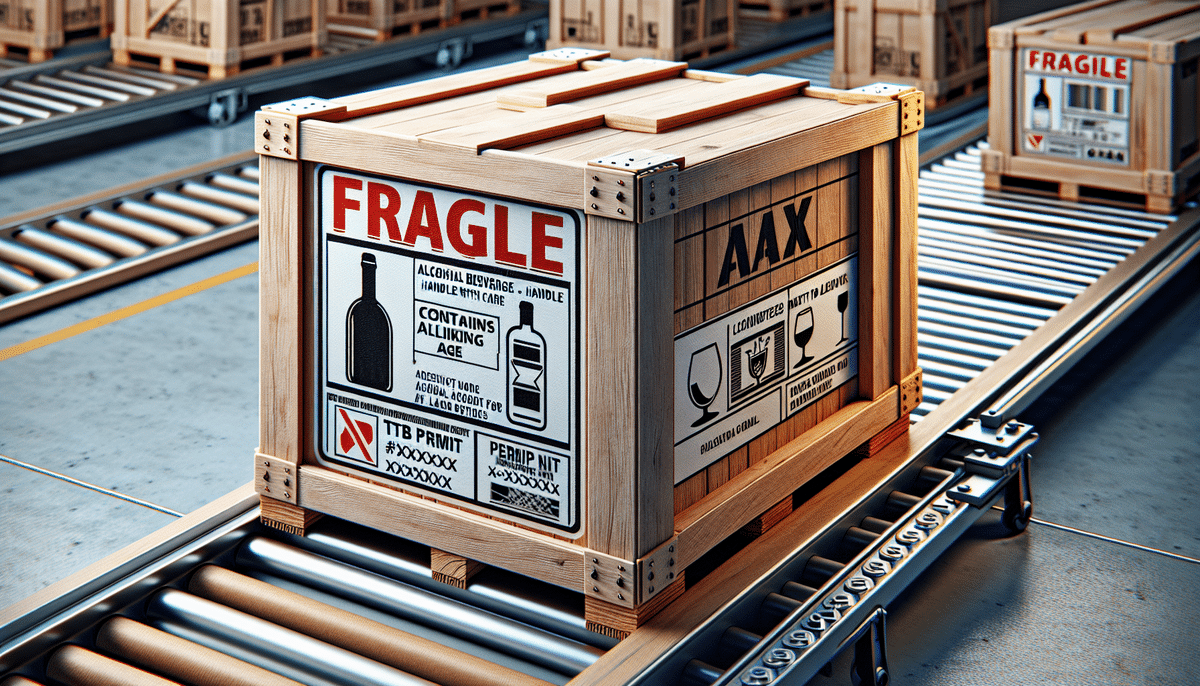Legal Requirements for Shipping Alcohol in the United States
Shipping alcohol across state lines in the United States involves navigating a complex landscape of laws and regulations. Whether you're a business looking to expand your market or an individual interested in sending a gift, understanding the legal framework is essential to ensure compliance and avoid hefty penalties. This guide provides an in-depth analysis of the legal requirements, best practices, and considerations for shipping alcohol safely and legally.
Understanding Federal and State Regulations
Federal Oversight by the TTB
The Alcohol and Tobacco Tax and Trade Bureau (TTB) oversees the regulation of alcohol at the federal level. The TTB mandates that any entity wishing to ship alcohol across state lines must obtain a federal permit. This applies to both individuals and businesses, ensuring that all shipments comply with federal standards for safety and legality.
State-Specific Laws and Compliance
Beyond federal regulations, each state has its own set of laws governing the shipment of alcohol. Some states outright prohibit the shipment of certain types of alcohol, while others allow it under specific conditions. For example, states like California and New York have detailed regulations that must be followed meticulously. It's crucial to research and adhere to the laws of both the originating and destination states to ensure compliance.
Obtaining the Necessary Permits and Licenses
Federal Permits from the TTB
To legally ship alcohol, businesses must apply for and secure a federal permit from the TTB. This involves a thorough application process, including background checks and verification of compliance capabilities. The permit must be renewed biennially, and any changes in shipping practices or business operations should be reported to the TTB to maintain compliance.
State Licenses and Permits
In addition to federal permits, certain states require additional licenses for shipping alcohol. These may include state-specific retail licenses, shipping permits, and adherence to distribution laws. For detailed information, refer to state government resources or consult with a legal expert specializing in alcohol laws.
Types of Alcohol Permitted for Shipping
Beer and Wine
Shipping beer and wine is generally permissible across most states, provided all federal and state regulations are met. However, it's essential to verify the specific restrictions of the destination state, as some may have limits on quantity or require special permits.
Spirits and Hard Liquor
Shipping spirits and hard liquor is more heavily regulated compared to beer and wine. Many states impose strict controls or outright bans on the shipment of distilled spirits. For instance, states like Utah and Virginia have stringent laws that limit or prohibit the shipping of spirits without specific licenses.
Age Verification and Recipient Compliance
Legal Drinking Age Requirements
All alcohol shipments must verify that the recipient is of legal drinking age, which is 21 years old in the United States. Carriers typically require an adult signature and may ask for government-issued identification upon delivery to ensure compliance.
Carrier Policies on Age Verification
Different carriers have varying policies regarding age verification. For example, FedEx and UPS have specific procedures in place to verify the recipient's age and may offer additional services to ensure compliance with legal requirements.
Packaging and Labeling Standards
Proper Packaging Techniques
Alcohol must be packaged securely to prevent breakage and leakage during transit. This typically involves using sturdy boxes, cushioning materials, and sealing the package properly. Adhering to IPA standards for packaging can help ensure the safe delivery of alcoholic beverages.
Mandatory Labeling Information
Each package must include specific labeling information, such as:
- Alcohol content by volume
- Sender and recipient's name and address
- Federal permit number
- Warnings like "Contains Alcoholic Beverages"
Proper labeling not only ensures legal compliance but also informs carriers and recipients about the nature of the shipment.
Cost Considerations: Fees and Taxes
Shipping Fees
Shipping alcohol often incurs higher costs compared to standard shipments due to the need for specialized handling, age verification, and secure packaging. Carriers may charge premium rates for alcohol deliveries, which vary based on the weight, volume, and distance of the shipment.
Taxes and Excise Duties
In addition to shipping fees, businesses must account for taxes and excise duties. The TTB's Tax Guide provides detailed information on the applicable taxes based on the type and quantity of alcohol being shipped. Properly calculating and remitting these taxes is crucial to avoid legal repercussions.
Handling Returns and Damaged Shipments
Carrier Procedures for Damages
Despite best efforts, shipments can sometimes arrive damaged. It's important to understand the carrier's policies on handling such situations. Most major carriers offer insurance options and have procedures for filing claims to recover costs associated with damaged or lost alcohol shipments.
Return Policies and Legal Obligations
When returning alcohol, ensure that the process complies with both federal and state laws. This includes proper documentation and adherence to any return restrictions imposed by the destination state. Working closely with the carrier and possibly legal counsel can facilitate smooth returns.
Best Practices for Secure and Compliant Alcohol Shipping
- Verify Recipient Age: Always confirm that the recipient is of legal drinking age using reliable verification methods.
- Choose Authorized Carriers: Select carriers experienced in handling alcohol shipments and familiar with the relevant laws.
- Secure Packaging: Use high-quality, sturdy packaging materials to protect the contents during transit.
- Accurate Labeling: Ensure all necessary information is clearly labeled on the package.
- Budget Appropriately: Account for higher shipping fees and applicable taxes when planning shipments.
- Stay Informed: Keep up-to-date with changes in federal and state alcohol shipping laws to maintain compliance.
Exploring Alternatives to Traditional Shipping
If shipping alcohol directly proves too cumbersome or costly, consider alternative methods such as:
- Local Purchases: Encourage recipients to buy alcohol locally, reducing the need for shipping.
- Courier Services: Use specialized courier services that handle alcohol shipping with expertise.
- Online Delivery Platforms: Utilize platforms that offer direct ordering and delivery from licensed retailers.
These alternatives can offer more streamlined and potentially cost-effective solutions while ensuring compliance with all legal requirements.
Conclusion
Shipping alcohol within the United States is a legally intricate process that requires careful adherence to federal and state regulations. Securing the necessary permits, choosing the right carriers, ensuring proper packaging and labeling, and verifying the recipient's age are all critical steps to ensure a legal and safe shipment. By following the guidelines outlined in this guide and staying informed about ongoing regulatory changes, businesses and individuals can navigate the complexities of alcohol shipping effectively and responsibly.




















